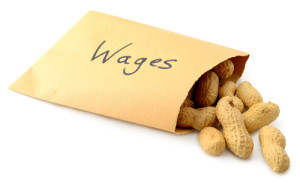 The federal minimum wage is a body of law that prohibits employers from hiring employees for less than the given hour or monthly minimum wage. The first federal minimum wage was signed into law by President Franklin Roosevelt in 1938.
The federal minimum wage is a body of law that prohibits employers from hiring employees for less than the given hour or monthly minimum wage. The first federal minimum wage was signed into law by President Franklin Roosevelt in 1938.
The main purpose of the creation of the federal minimum wage was to keep the American workers out of poverty level and increase the consumer purchasing power that will in turn stimulate the economy of the country. The current federal minimum wage is $7.25 an hour.Several cities of US approved the gradual raise of the minimum wages to $15 an hour in 2014.
The pros and cons of raising the federal minimum wage
There are people who believe the federal minimum wage should be raised, while others think it is a bad idea. The federal minimum wage became a hot topic when the city of Seattle voted to enact a $15 per hour minimum wage. The topic has now taken center stage at the United States Presidential debate. Former United States Secretary of State Hillary Clinton, one of the candidates running for President, has proposed raising it to $12 an hour, while Senator Bernie Sanders, another candidate, wants it to be $15 an hour.
Some arguments for raising the minimum wage are:
Improved living standard
Citizens will experience a pay raise that could meet their basic needs and also their living standards. A report from the (CBO) that is the Congressional Budget Office in 2013 estimated that 900,000 workers will move above the poverty level. Workers will rely less on the government and also on the state-sponsored financial aid programs.
Higher worker morale
Workers will be motivated to work since their wages will increase. Workers will also be retained over a long haul. A cohesive team of employees will be maintained easily since the pay encourages talented individuals to stick around. All this could in turn improve productivity and help keep turnover rates down.
Consumer spending uptick
Extra pay for workers will trickle down the retailers, and this will boost the economy. The increased wages will make consumers save a lot.
Arguments for not raising the minimum wage are:
Business will raise their prices
Business owners will increase the price of their commodities to shoulder the costs. They will do so to make the money up and gather for the increased wages. Charging more will only be there option to meet their expenses of paying workers.
Reduced desire for career improvement
A pay raise will boost workers’ morale, and this will impair their drive for self-betterment. Workers receiving $15 per hour might be less likely to go colleges and improve their socioeconomic status. The workers will not seek out a specialized job when they see a pay rise of their current salary.
Less jobs will be available for lower earners
Some people argue higher wages will stunt job growth. The more an employer pays for a single employee’s labor, the less they will have to hire more people. Therefore over time less people will be employed.
The debate over the federal minimum wage will not end any time soon. Some will adamantly proclaim it will help people and the economy, while others will denounce that notion. No matter where you stand, the federal minimum wage will remain a popular topic in the 2016 Presidential debate and at dinner tables.
Let us know in the comments how you feel about the federal minimum wage. Should it be increased or left alone?
Photo credit: zdiviv | FreeDigitalPhotos.net
